Brand New:
1 Month: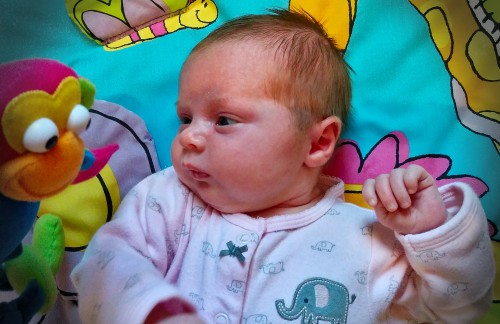
2 Months:
3 Months: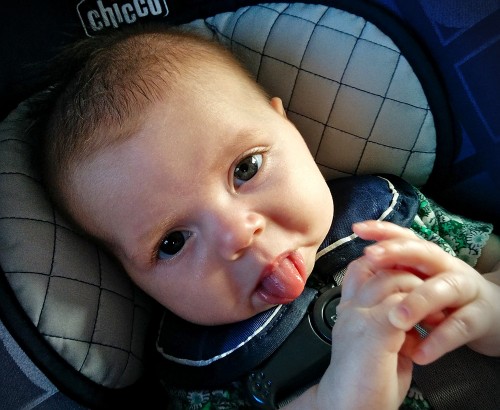
4 Months:
5 Months:
6 Months: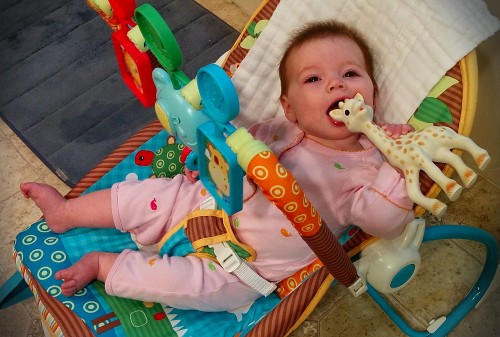
7 Months:
8 Months:
9 Months: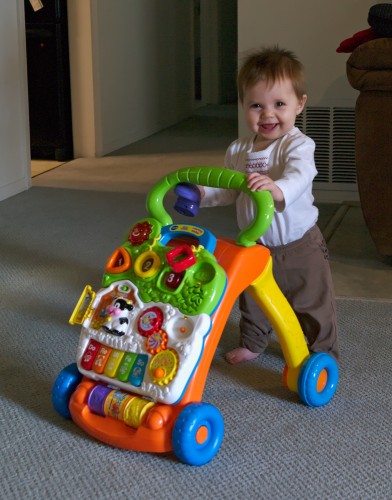
10 Months:
11 Months:
One Year!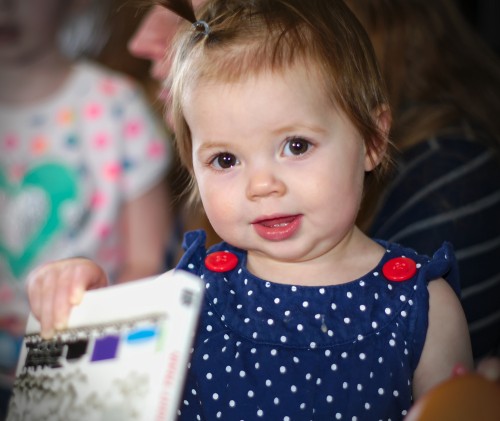
Brand New:
1 Month:
2 Months:
3 Months:
4 Months:
5 Months:
6 Months:
7 Months:
8 Months:
9 Months:
10 Months:
11 Months:
One Year!
Corinne turned 1 on Thursday. She's almost walking (she'll try to take a step and then go into a controlled descent). She's making some sounds, but not saying anything identifiable in any reproducible manner. But she seems to have a sense of rhythm, so she has that going for her. Regardless, she's still adorable.
Jess wasn't feeling well so I took Thursday off to stay home and help her get some rest. Corinne opened presents after Heather got home from preschool and before she had to leave for gymnastics.
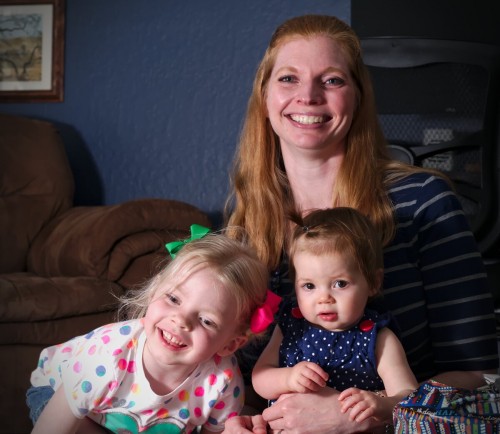
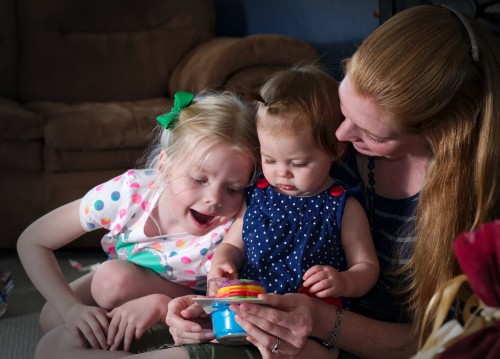


After gymnastics it was out to dinner at Cravings (pasta/pizza/calzones) and then back home for cake. A white cake, colored blue, with chocolate ganache filling and vanilla frosting.

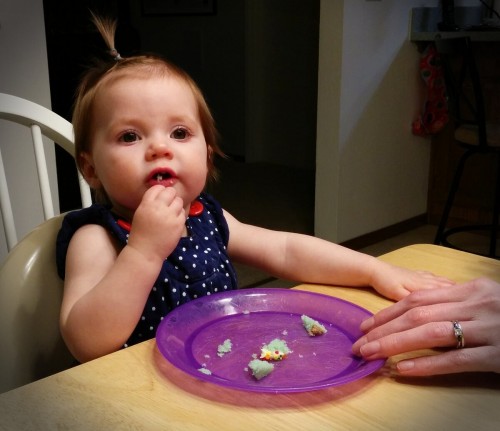
Corinne was pretty excited, but didn't like the frosting on her fingers. I don't think she ate more than a few crumbs. The rest of us are enjoying it though.
I started playing a game, "The Talos Principle" yesterday. It's a puzzle game with philosophical/religious overtones. Throughout the game you find little snippets of communication from in-game people or passages from books (real-life and in-game). I thought this section of an in-game speech was particularly on point and relevant to my recent ruminations:
They say "doubt everything," but I disagree. Doubt is useful in small amounts, but too much of it leads to apathy and confusion. No, don't doubt everything. QUESTION everything. That's the real trick. Doubt is just a lack of certainty. If you doubt everything, you'll doubt evolution, science, faith, morality, even reality itself - and you'll end up with nothing, because doubt doesn't give anything back. But questions have answers, you see. If you question everything, you'll find that a lot of what we believe is untrue...but you might also discover that some things ARE true. You might discover what your own beliefs are. And then you'll question them again, and again, eliminating flaws, discovering lies, until you get as close to the truth as you can.
Questioning is a lifelong process. That's precisely what makes it so unlike doubt. Questioning engages with reality, interrogating all it sees. Questioning leads to a constant assault on the intellectual status quo, where doubt is far more likely to lead to resigned acceptance. After all, when the possibility of truth is doubtful (excuse the pun), why not simply play along with the most convenient lie?
Questioning is progress, but doubt is stagnation.
[Before we start, I want to acknowledge that people that know me know that I have no particular love for Apple in general and that my defense of their position here could hardly be argued as simple fanboyism.]
Apple is in the news recently regarding their refusal to go to unusual lengths to provide access to the contents of an iPhone. One of the most interesting bits is that Apple is not saying that what they're being asked to do is technically impossible. They are explicitly stating that they won't do it--not that they can't do it.
This is an interesting distinction partly because it concedes the point that many have made for years that if Apple wanted to access any user's device they could, but it's a matter of necessary effort. Apple gets credit for having intentionally made it harder for them to access a user's device, but so long as they control the hardware, the software, the update service, and the "cloud" storage it seems unlikely they will choose to reach a point where they have no technical ability to access a user's device [though there are now rumors circulating that they will, we'll see]. Creating a device that they can't access essentially requires that they give up the ability to automatically push software updates without resetting the phone to factory conditions [that is, a user would have to first unlock the device and provide some interaction for the update to happen].
But that's more of a side note to the main event here. From my perspective there is really one main point and a corollary that need to be discussed:
1. How much effort should a company be required to expend to comply with law enforcement desires?
1.a. Should companies be required to design products to be accessible by law enforcement (i.e., mandatory backdoors)?
Note: Whatever answer you provide will be used by our and other governments to demand the same cooperation for future cases.
And why would anyone use or buy backdoored products when actually secure tools are readily available (a backdoor is, by definition, a security vulnerability)?
Many people see Apple as being obstructionist in their stand. After all we're talking about a phone used by someone who thought shooting a bunch of people was a good idea. And they know that. I imagine that Tim Cook is thinking a lot about this quote (generally attributed to H.L. Mencken):
The trouble with fighting for human freedom is that one spends most of one's time defending scoundrels. For it is against scoundrels that oppressive laws are first aimed, and oppression must be stopped at the beginning if it is to be stopped at all.
Apple is very much relying on a slippery-slope argument. For a slippery-slope argument to be valid you need to show a basis for the idea that if you provide A then soon you'll be asked for B and then C and then D and then E. Often times slippery-slope arguments are made fallaciously--providing support is necessary to turn it into a valid argument.
I think Apple can make a convincing slippery-slope argument here because of the long history of law enforcement, and the executive branch of the government in general, demanding more and more information of lesser and lesser importance almost for no other reason than that the information is available. To the point that in recent history illegal wiretapping scooped up data on every American phone call for years, just because they could.
Apple can also show that other countries have and will demand that Apple provide access to devices for reasons that Americans would find unacceptable (religion, sexual orientation, political views, etc.).
Apple's argument is that the only way to guarantee civil liberties is not to make violating them illegal, but to make violating them impossible. It's a very strong stand.
You, as an American citizen, have to think about this and decide where the line is. Too many people make knee-jerk decisions without spending any time to consider the continuum of possibilities and outcomes.
I have a habit of making up little songs that I sing to Heather. They're not impressive in any way, but she likes them (usually). The most often criticism I get from her is to "make them more rock-starry." I don't really know where she got the concept, but she then is happy if I give the song a more rock-and-roll style.
Because of her regular insistence on my songs being more "rock-starry," on Saturday I told her I was going to put on a song for her that I thought she'd like. I told her it was a song I associate with Grandpa (her Grandpa, my Dad) playing on Saturday mornings for some reason.
Dickerson kids should now make a guess about the song, we'll see if we developed a similar association.
I played "I'm gonna be (500 miles)" by The Proclaimers and she thinks it's awesome. We listened to it a few times and she can sing along with some parts. During the chorus she got her stroller and would strut around in circles pushing it along.
----
Now for something completely different.
One of the kids from Heather's preschool class had a birthday party this week. It was Monday evening and Corinne was going to need to be going to sleep, so I took Heather to the party. It was at a party place in town that has a room with big inflatable play structures and a rock-climbing wall and some other rooms for eating and such. We arrived and I told Heather she should find the birthday girl and say, "Hello" and wish her happy birthday. But Heather didn't want to leave my side.
She was a little overwhelmed by the noise of the fans on the inflatable things and by the number of adults milling about. So we walked around the room getting a feel for the place and she started to relax. I asked her if she recognized the kids. She said they were the kids from preschool (with that tone of voice that says, "obviously"). I asked her if she could tell me their names. So she started rattling off the names of the kids in her class. I interrupted her and asked if she could tell me who particular kids were, "Who's this girl who came over and said 'hi'?" But she didn't know. We did this a few more times and she didn't seem to know the names of any of the girls. Then a couple of boys ran by and she did know their names.
At school they do a game where they say a kid's name and toss them a ball. When they do this they're all wearing name tags. Heather has no problem with names during this game.
We think she's reading the name tags (probably not completely, but recognizing enough letters to then pick the right name from her memorized list) during the game.
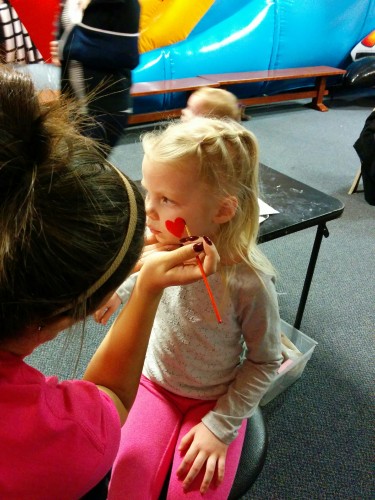
I think she must have the same issue that I have with recognizing faces. I can learn to recognize a face, but it seems to be harder for me than it is for other people. Especially if I run across someone outside of the usual context--it can be incredibly hard. Often times I will be able to recognize that I know the person, but have no idea how or why or who they are. Heather seems to be the same way. At the party she definitely recognized the kids, but couldn't connect them with their name, but she knew all their names.
I find it really interesting. It took a long time for me to realize that I took a lot longer to learn names and faces of people. I don't think it was until I was in college that I really figured it out. Which probably has something to do with growing up in a town where the entire grade was the same ~100 kids from kindergarten through graduation. I would have learned all the kids eventually and then they didn't change much. Whereas in college there was little consistency.
Taking her to that party and watching her in a full-blown social situation where I don't know anybody and can't really help things along made me realize how much of my personality she has. Jess says she sees a lot of her own (Jess') personality in Heather as well.
We know she does play with other kids in a very normal way, but we also, at times, see her play less with the other kids and more in-the-vicinity-of the other kids a lot too. And she will, not-uncommonly, just go off by herself to play.

At the party, when it was time to sit down and eat, she went in and carefully sat at the corner seat furthest from where the other kids were already sitting. The table then filled in around her. During the time they were all sitting at the table she only lightly interacted with any of the kids. I recognized that I was displaying the exact same behavior. I didn't really interact with any of the other parents. I tried to stay to the outside of the room so that Heather would be more likely to interact with the other kids and less likely to just interact with me, but I suppose I wasn't being a good example of pro-social behavior. At one point she wanted to tell me knock-knock jokes. I redirected her to tell them to the other kids at the table which she did just fine. She wasn't unhappy at all--just not really interested in the other kids.
This makes me feel a little torn. I fully recognize the benefit of developing the ability to have smooth social interactions, but I also recognize that it probably doesn't bother her (in the same way that it didn't bother me at all that I wasn't interacting with the other parents at the party).
In some ways its feeling like I've acquired all this understanding about the world and now have to decide would I have done anything different in my own life growing up that I should now encourage Heather to do.